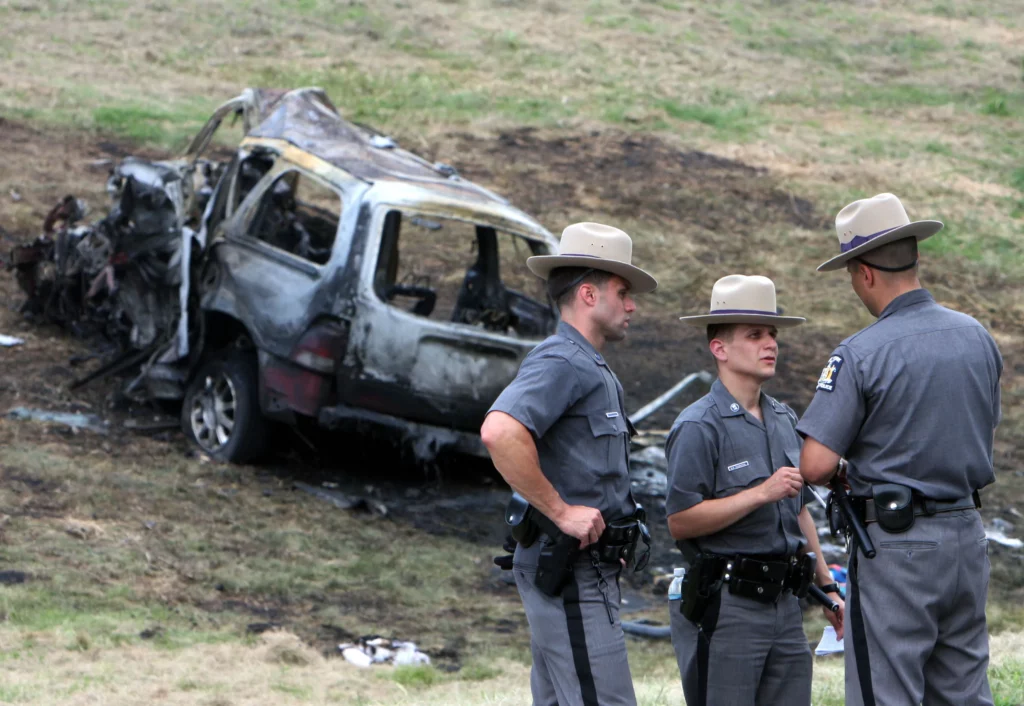The Manslaughter Deaths Caused By Diane Schuler Erractic Driving in Westerchester County New York
On July 26, 2009, a seemingly ordinary summer day turned into one of the deadliest traffic incidents in New York State history. Diane Schuler, a 36-year-old mother of two, caused a head-on collision that resulted in the deaths of eight people on the Taconic State Parkway in Mount Pleasant, Westchester County. The incident, which occurred just after 1:30 PM, shocked the nation, leaving a trail of grief, unanswered questions, and controversy in its wake. Schuler, who had been driving the wrong way for almost two miles, had a toxicology report that revealed she was highly intoxicated and had marijuana in her system. The crash left a deep mark not only on the families involved but also sparked a national conversation on impaired driving, denial, and personal accountability.
The Tragic Day Unfolds
Diane Schuler was driving a red 2003 Ford Windstar minivan, carrying her 5-year-old son, Bryan, her 2-year-old daughter, Erin, and her brother’s three young daughters, aged 5, 7, and 8. The group had just left a family camping trip in Sullivan County, New York, and was headed back to their Long Island home. Schuler’s husband, Daniel Schuler, had left earlier in a separate vehicle, driving their dog back from the campsite.
As the family traveled southbound on the Taconic State Parkway, Schuler suddenly began driving northbound in the southbound lanes, a maneuver that confused and horrified oncoming drivers. Calls began flooding into 911, reporting the red minivan speeding the wrong way on the busy parkway. Tragically, before police could intervene, Schuler’s van collided head-on with a Chevrolet TrailBlazer, driven by 49-year-old Guy Bastardi, who was traveling with his father, Michael Bastardi, 81, and family friend, Daniel Longo, 74. The violent collision killed all three men in the TrailBlazer instantly, along with Diane Schuler, her daughter Erin, and her brother’s three daughters. Her son, Bryan, was the only survivor from the minivan, suffering severe injuries but miraculously pulled through.
Toxicology Report Reveals Startling Facts
As investigators combed through the wreckage, the cause of the crash remained elusive. The police initially explored various possibilities, including mechanical failure, medical issues, and driver error. However, it was the toxicology report, released days after the crash, that provided a shocking revelation: Diane Schuler had a blood alcohol content (BAC) of 0.19%, more than twice the legal limit of 0.08%. This was equivalent to the effects of drinking about 10 shots of alcohol in a short period. Along with alcohol, the report revealed the presence of THC, the active ingredient in marijuana, indicating Schuler had consumed marijuana within an hour of the crash.
In addition to the alcohol and marijuana found in her system, police discovered a broken 1.75-liter bottle of vodka in the wreckage of the van, suggesting that Schuler had been drinking while on the road. This finding was hard for many to reconcile, as Schuler was known by friends and family as a responsible and caring mother who didn’t exhibit the behaviors of someone who abused alcohol or drugs.
Her Husband’s Denial and the Family’s Defense
In the wake of the toxicology report, Diane Schuler’s husband, Daniel Schuler, vehemently denied that his wife had a drinking problem or used drugs. In several interviews with the media, Daniel stated that his wife was a “perfect mother” and a “trusted individual,” adamant that Diane never drank heavily or smoked marijuana, particularly not around their children. He insisted that there must have been another explanation for the crash and the toxicology findings, suggesting that perhaps his wife suffered from a medical issue such as a stroke or an undiagnosed condition that led to her erratic behavior.
The family pursued an independent investigation into the crash, commissioning experts to examine Schuler’s health and mental state. They hired a forensic pathologist who argued that Diane Schuler might have had an undiagnosed medical condition such as diabetes, which could have contributed to her impairment and led to the high BAC and wrong-way driving. However, this theory has been widely contested, and toxicology experts reaffirmed the accuracy of the original findings.
The Public Reaction and Legal Aftermath
The incident captured national attention due to the bizarre circumstances surrounding the crash and the sheer number of lives lost. Public reaction to Daniel Schuler’s denial of his wife’s intoxication was mixed, with many expressing sympathy for the grieving husband and father, while others criticized his unwillingness to acknowledge the role alcohol and drugs may have played in the tragedy.
In response to the tragedy, a lawsuit was filed by the Bastardi family against Diane Schuler’s estate, claiming wrongful death and seeking accountability for the deaths of Guy and Michael Bastardi and Daniel Longo. Meanwhile, Daniel Schuler also filed a lawsuit against the state of New York and his brother-in-law, Warren Hance, who owned the minivan, alleging that the roadway was unsafe and that the vehicle was improperly maintained. Both legal battles would take years to settle.
The Legacy of the Tragedy

The crash left a lasting impact on the families of both the victims and the perpetrator. Warren Hance, the father of the three young girls killed in the crash, later established a foundation in their honor, the Hance Family Foundation, which promotes programs that empower and educate young girls. Meanwhile, Daniel Schuler has continued to maintain that his wife was not an alcoholic or drug user, despite mounting evidence to the contrary.
The tragedy also reignited conversations about the dangers of impaired driving, leading to increased advocacy for stricter enforcement of DUI laws and educational campaigns to prevent similar incidents in the future. The fact that Diane Schuler had no prior history of substance abuse, coupled with her role as a working mother, left many questioning how a seemingly responsible individual could cause such a catastrophic event.
Unanswered Questions and Enduring Mysteries
To this day, the mystery surrounding Diane Schuler’s actions remains unsolved. How could a woman described as meticulous and caring make the decision to drive under the influence with five children in her car? Why did she continue driving the wrong way for almost two miles without correcting her course? Despite the toxicology report’s damning evidence, her family has stood by their belief that this tragedy was caused by something other than intoxication.
The case of Diane Schuler is both tragic and perplexing, a stark reminder of the fragility of life and the lasting consequences of a single, seemingly uncharacteristic decision. Though the families involved continue to grieve, the scars left by that fateful day on the Taconic Parkway extend far beyond those directly affected by the crash. It remains a sobering tale of loss, denial, and the search for closure in the face of unimaginable tragedy.
Theories and Speculations Surrounding the Diane Schuler Crash
The horrific crash involving Diane Schuler on July 26, 2009, which claimed the lives of eight people, remains one of the most perplexing and tragic cases in recent history. Despite the clear toxicology results showing that Schuler was intoxicated with both alcohol and marijuana, a number of theories and speculations have emerged over the years in an attempt to explain the bizarre and devastating events leading up to the crash. These theories range from medical conditions to personal struggles, with many speculating that the true cause of the crash may never be fully understood.
1. The Toxicology Report and Its Controversy
One of the most contentious elements of the case is the toxicology report, which found Diane Schuler’s blood alcohol content (BAC) at 0.19%, along with traces of THC (the active ingredient in marijuana). This would have placed her in a highly impaired state, enough to cause confusion, delayed reactions, and poor judgment. However, Schuler’s family, especially her husband Daniel, has consistently denied that Diane had a problem with alcohol or drugs. They claim she was a responsible, loving mother who would never endanger her children, let alone drive under the influence.
This denial led to various speculations questioning the reliability of the toxicology report. Some theorize that a medical condition could have skewed the results, while others suggest that the alcohol might have entered her bloodstream posthumously, although toxicology experts have consistently debunked these claims. The presence of a large, broken vodka bottle in the vehicle has been hard to ignore, and combined with the test results, it paints a picture that Diane Schuler was, tragically, highly intoxicated while driving. Yet, the fact that her family insists otherwise continues to fuel alternative theories.
2. Medical Condition Theories: Stroke, Diabetes, or Other Illnesses
A leading theory that Daniel Schuler and some medical experts have proposed is that Diane Schuler may have suffered from a sudden, undiagnosed medical condition that impaired her ability to drive. Some have speculated that she might have experienced a stroke, a transient ischemic attack (mini-stroke), or an episode of hypoglycemia (low blood sugar), which could have caused confusion, disorientation, and poor decision-making.
Diane Schuler was reportedly suffering from a tooth abscess in the days leading up to the crash, and some suggest that the pain and potential infection might have triggered a medical episode. Daniel Schuler also mentioned that his wife had complained of blurry vision and discomfort during the morning of the crash. Some theorists argue that these symptoms could have been warning signs of a stroke or other neurological event.
Diabetes has also been considered as a possible factor. If Schuler was diabetic, undiagnosed or otherwise, a drop in her blood sugar could have caused her to become severely disoriented, potentially mimicking the effects of intoxication. However, the toxicology report showed no signs of a medical emergency, and doctors have largely ruled out these conditions based on available evidence.
3. Psychological Factors and Mental Breakdown
Another theory centers on the possibility that Diane Schuler suffered from an acute psychological breakdown or emotional crisis in the moments leading up to the crash. While Schuler was described as a responsible, composed woman, some believe that the pressures of her life could have built up over time, culminating in a moment of emotional collapse.
There are speculations that Schuler may have been dealing with hidden stressors—perhaps marital tension, work pressures, or personal struggles—that caused her to turn to alcohol and marijuana as a form of self-medication. However, no direct evidence of significant psychological or emotional issues has surfaced publicly. Schuler’s family and friends continue to maintain that she was a “supermom,” capable of handling the demands of her career and family with grace.
Despite this, some speculate that Schuler could have experienced a sudden psychological break, leading her to make irrational decisions. The fact that she drove the wrong way on a major highway for almost two miles without attempting to stop or correct her course is one of the most puzzling aspects of the case. It has led some to wonder if she had momentarily lost touch with reality due to an overwhelming psychological or emotional crisis.
4. Substance Use as a Coping Mechanism
Despite her husband’s denial, there are theories that Diane Schuler may have been using alcohol or marijuana more frequently than those around her realized. Substance use, especially when kept hidden from family or friends, is not uncommon, and it is possible that Schuler had been using alcohol or marijuana to cope with personal stress. The fact that a vodka bottle was found in her car suggests that she might have been drinking while driving or had consumed a significant amount of alcohol before the journey.
There are speculations that Diane Schuler could have been a “high-functioning” user of alcohol or marijuana, meaning she could have hidden her consumption effectively enough that it did not interfere with her day-to-day responsibilities, at least in the eyes of those around her. This would explain why her family, including her husband, was unaware of any substance abuse issues, while the toxicology report clearly indicated heavy intoxication at the time of the crash.
5. A Deliberate Act: Was It a Murder-Suicide?
One of the darker theories that has emerged is the possibility that Diane Schuler’s actions were deliberate, potentially pointing to a murder-suicide. This theory posits that Schuler intentionally drove the wrong way in a desperate, premeditated act to take her own life and those of her passengers. While there is no concrete evidence to support this theory, some believe that Schuler’s decision to drive against traffic for nearly two miles without attempting to stop, swerve, or correct her path could suggest intentionality rather than a mistake caused by impairment.
Those who entertain this theory argue that if Schuler were truly that intoxicated, she might not have been able to maintain the level of control she exhibited in driving the wrong way for an extended period. They question why she would continue driving despite the numerous calls to 911 reporting the dangerous situation. However, no evidence has surfaced to suggest that Schuler was suicidal or had any history of mental health issues that could have pointed to such an extreme act.
6. The Impact of Denial and Personal Reputation
The public denial of the toxicology findings by Daniel Schuler and other family members has also contributed to speculation that perhaps they are aware of more than they are letting on. Some believe that the Schuler family’s strong defense of Diane’s character may be motivated by a desire to protect her reputation posthumously or shield their children from the harsh reality of the crash. Others theorize that the family may be in denial, unable to reconcile the version of Diane they knew with the version suggested by the toxicology report.
There is also the possibility that Daniel Schuler truly did not know about his wife’s substance use and is simply unable to accept the evidence, given the catastrophic outcome. Denial can be a powerful psychological response to trauma, and it is plausible that the Schuler family’s refusal to accept the toxicology results is an expression of their overwhelming grief and shock.
Conclusion
More than a decade after the crash, the true cause of Diane Schuler’s actions on that fateful day remains a mystery. Despite the toxicology report’s definitive findings of alcohol and marijuana intoxication, her family continues to reject the notion that Schuler would have willingly driven under the influence, especially with five children in the car.
Theories and speculations abound, from medical conditions to psychological breakdowns, hidden substance use, or even deliberate intent. Ultimately, the tragic crash that claimed eight lives on the Taconic State Parkway has left more questions than answers, and it is unlikely that we will ever fully understand what led Diane Schuler to make the decisions that resulted in such devastation. The case continues to haunt the families of those involved and serves as a sobering reminder of the complexities that often lie beneath the surface of even the most outwardly stable lives.
FAQs
1. What happened on July 26, 2009, on the Taconic State Parkway? On July 26, 2009, Diane Schuler caused a head-on collision while driving the wrong way on the Taconic State Parkway. The crash killed eight people, including Schuler, her daughter, three of her nieces, and three men in another vehicle.
2. What did the toxicology report reveal about Diane Schuler? The toxicology report revealed that Diane Schuler had a blood alcohol content of 0.19%, more than twice the legal limit, and had marijuana in her system at the time of the crash.
3. Did Diane Schuler have a history of alcohol or drug use? Diane Schuler’s husband, Daniel Schuler, denies that his wife had any issues with alcohol or drug use. However, the toxicology report contradicted this claim, showing significant alcohol and marijuana consumption.
4. What legal actions followed the crash? The Bastardi family filed a wrongful death lawsuit against Diane Schuler’s estate. Daniel Schuler also sued New York State and his brother-in-law for alleged roadway safety issues and vehicle maintenance failures.
5. Did Diane Schuler’s family ever accept the toxicology findings? Diane Schuler’s husband and family have consistently rejected the toxicology report’s findings, arguing that a medical condition or other factors may have caused her to act erratically on the day of the crash.
6. What is the legacy of the crash? The crash left a legacy of grief and questions for the families involved. It also brought attention to the dangers of impaired driving, leading to advocacy for stricter DUI laws and educational programs aimed at preventing similar tragedies.
Discover more from City Towner
Subscribe to get the latest posts sent to your email.




